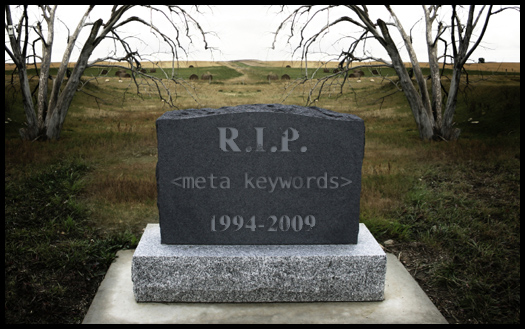Meta keywords is dead, long live rich content!

I spotted on twitter last night an official announcement from Google that people in the SEO community had long suspected: Google no longer use the meta keywords tag in web search.
Sounds fun, but what are meta tags?
A meta tag is a line of HTML code that sits in the <header> section of your web page and provides information to search engine spiders and web browsers about the contents of your webpage. Different meta tags tell the browser or spider different things, it might be whether the web page is written in English or French, who wrote the page, or by what rules the browser should interpret or render the page.
Meta tags & Search Engines Sitting in a Tree
In the early days of the Internet when search bots were less sophisticated, meta-tags played a really important role in how search engine spiders searched your website and where they decided to rank you in the search engine results page. Search engine spiders couldn’t really decipher and prioritise all your web page content (as they do now), so were helped out by two tags in particular:
- the meta description tag (the brief description of your site that appears in the Google results page)
- and the meta keywords tag – a tag that tells Google & Co what keywords you would like your site to rank for.
But having a tag which lets you tell Google which keywords you would like be listed for is just way too easy and was never really going to be sustainable. As the Internet got bigger and webmasters (we were called that back then) wised up to to search engine optimization, people started stuffing their meta tags with keywords even if it didn’t reflect the content of their site.
Do I need to do anything?
Maybe – if you’re particularly paranoid you might want to remove your meta keywords tags from your existing websites, it certainly won’t help your Google listing but it does give away your target keywords to any enquiring competitor who has discovered how to view source (hint: right click). For most websites however keeping your meta keywords tags certainly won’t do any harm.
I hope you found this post interesting, I might do some more on search engine optimisation – let me know if you’d like me to cover any areas in particular.
For full info read the full Google post, you might also like to follow Matt Cutt’s twitter stream (Matt is head honcho of the Google search engine spam team).
—
tom 🙂
